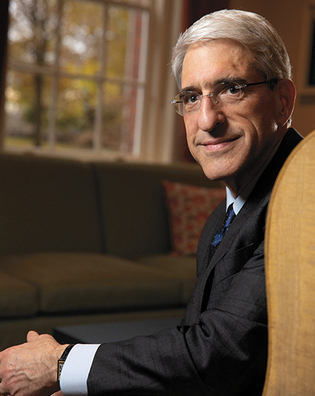 loading
loading
President's LetterYale and the climateThe university's initiatives to combat climate change. The Yale Alumni Magazine publishes a letter from President Peter Salovey ’86PhD in every issue. In this letter, the president discusses Yale’s continuing work to combat climate change.  Mark OstowView full imageDear Friends, This year marks the 50th anniversary of Earth Day, a global event dedicated to environmental action and understanding. Melting ice caps, rising global temperatures, and accelerating extinction rates point to a growing environmental crisis. At Yale, we are working across sectors and disciplines to tackle this global challenge and safeguard our planet for future generations. “Human-accelerated environmental change presents one of the greatest challenges of the twenty-first century,” as identified in the 2018 University Science Strategy Committee report. “Planetary solutions” is one of the top five areas for scientific investment at Yale, and it is an area of focus across the university. Faculty and students in the School of Forestry and Environmental Studies (F&ES), on the West Campus, in the School of Management, and in the Peabody Museum of Natural History work with colleagues in law, health sciences, architecture, engineering, economics, and the natural sciences. Together, they are creating knowledge that informs cutting-edge policy and practice. Yale has long prepared students to work across sectors to solve major challenges. For example, in 2018, William Nordhaus ’63, ’72MA, Sterling Professor of Economics, was awarded the Nobel Prize in Economics for transforming our understanding of the costs of environmental degradation and climate change. His work has influenced national and international thinking about how to curb carbon dioxide emissions. Today, our graduates are at the helms of government, nonprofit, business, and research enterprises with an environmental focus. As part of the annual “Celebrate Sustainability” event on campus this fall, five F&ES alumnae shared their experiences in the clean energy sector. Jessica Leung ’17MEM spoke about how companies are making significant investments in renewable energy. For other alumni, a hands-on course in renewable energy financing at Yale prepared them for their current careers. Now they are using their expertise to help businesses reduce carbon emissions. And beyond the business and energy fields, alumni from across Yale are working to address environmental justice, conserve biological diversity, and develop sustainable food solutions. By collaborating across sectors, Yalies are championing nonpartisan solutions to environmental problems. Recently, Yale hosted the CSG/ERC Northeastern State Legislative Climate and Energy Summit on campus. This event brought together elected officials from both major political parties, business leaders, policymakers, and Yale students and scholars. We also have a new Yale Environmental Dialogue initiative aimed at infusing fresh thinking into the national conversation about how to achieve a sustainable future, with a specific goal of identifying implementable, nonpartisan solutions. We are demonstrating it is possible to reach across the aisle to make environmental progress. I am proud that Yale’s record of public service and environmental stewardship goes back generations. Gifford Pinchot, an 1889 graduate of Yale College, helped found the School of Forestry. President Theodore Roosevelt appointed him to serve as the first chief of the US Forest Service, and he spearheaded conservation efforts across the United States. This spirit of cooperation has been key to Yale’s success in reducing emissions on our own campus, including our unique carbon-charge program. In 2016, we made a commitment to become carbon-neutral by 2050. We are on track to reach that target, and we are going even further. Last fall, I announced a task force to develop new goals for Yale’s Climate Action initiative—specifically, to explore how quickly Yale can achieve net zero carbon emissions. This goal aligns with the latest scientific research about the threats posed by climate change. By working together—students, faculty, staff, and alumni—we will ensure Yale remains a living laboratory for environmental stewardship. Today, entrusted with the care of our planet, we have a responsibility to address the world’s greatest challenges—as scientists, policymakers, entrepreneurs, scholars, and citizens. To our alumni, thank you for setting a remarkable example of environmental stewardship and leadership. Our work is a down payment on what we owe future generations, and I am optimistic we will make good on our obligation. With my warmest wishes,
The comment period has expired.
|
|